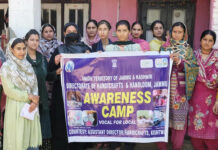While the abuse of drugs has Kashmir in its crutches, inhalants often enter the dark world of substances among minors. They constitute over 60 per cent of patients seeking treatment for addiction of inhalants.
A study published in the current edition of the Indian Journal of Social Psychiatry titled “Profile of Inhalant Users Seeking Treatment at a De-addiction Center in Kashmir” defined inhalant abuse contours Kashmir.
The study shows that 66.3 per cent of people reporting for treatment of inhalants are between 10-19 years. The same percentage of abusers of inhalants is of students, indicating how schools form the crucial place for interventions and surveillance of drugs in children.
The researchers have underlined that early-onset inhalant use was associated with various “deleterious outcomes: increased risk for inhalant dependence, subsequent heroin and injection drug use, other psychoactive drug use, and mental health problems including mood disorders and antisocial behaviour, especially interpersonal violence and early-onset conduct problems.”
The study shows “adhesives were the most predominant inhalant used in 100 % of cases”. The glue of various varieties ranging from the kinds used for carpentering to those used for fixing shoes and furnishing, doctors have found shocking cases of addiction among minors. “In our study, the inhalants included adhesives, typewriter correction fluid, diluents, and petroleum products, which are available easily and at a relatively low cost. Being a low-cost stationery item used in schools and offices and being easily available to children, correction fluid has been reported to be the most common inhalant abuse in India”.
Petrol, paint thinner and similar products are among the most abused inhalants in Kashmir, apart from others mentioned earlier.
The study found most of the inhalant users belonging to middle socioeconomic status and are from nuclear families.
Domestic violence, a “dictatorial” father, presence of step-parents, unstable family status, low levels of parental education, parental drug use, familial neglect, parental discord, and lack of supervision are the risk factors associated with abuse inhalants and early start to these drugs.
Notably, nearly 70 per cent of people seeking treatment for inhalant abuse were also smoking Cigarettes and Cannabis, the study has found. Over 30 of these had also moved on to abuse opioids and benzodiazepines.
The research seeks that inhalant abuse is recognized as a public health problem, and interventions at the school level are planned since the predominant user group is students.



























